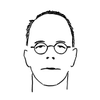


Books, quotes, notes.
Art, paintings, photos.
This profile is from a federated server and may be incomplete. Browse more on the original instance.


Books, quotes, notes.
Art, paintings, photos.
This profile is from a federated server and may be incomplete. Browse more on the original instance.